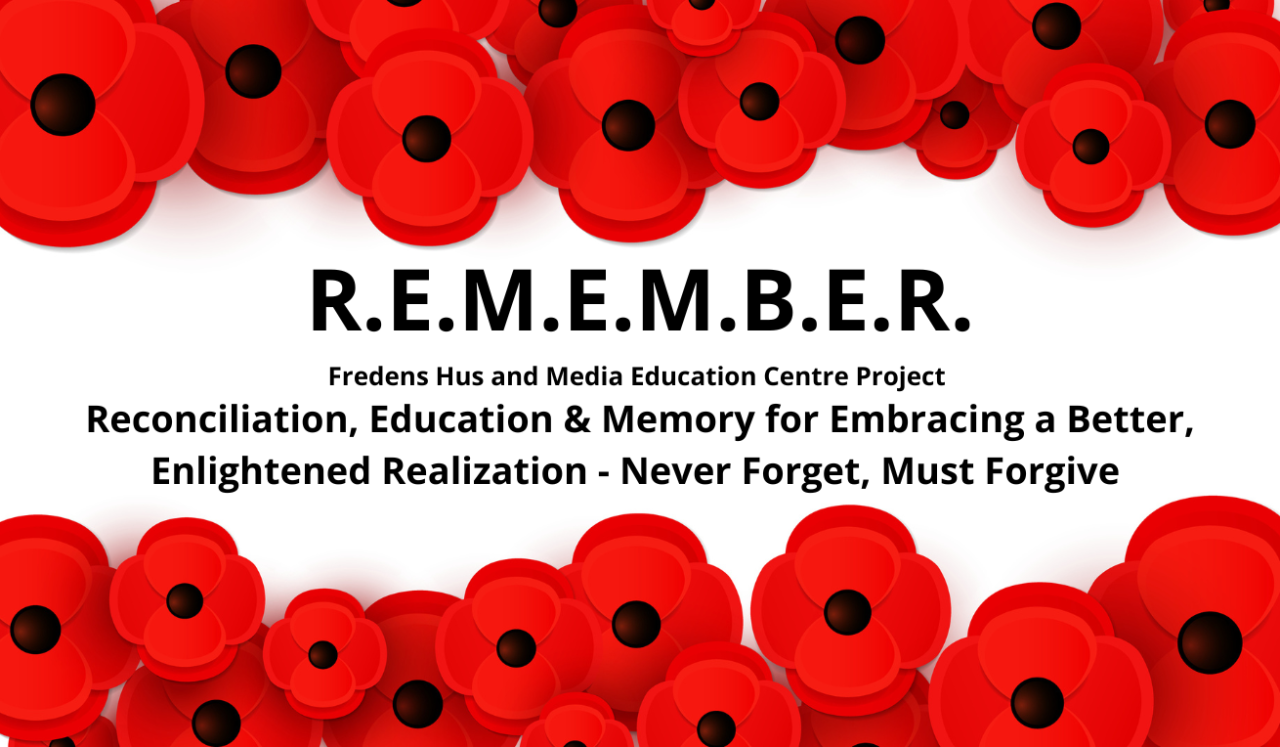Reconciliation, Education & Memory for Embracing a Better, Enlightened Realization – Never Forget, Must Forgive
Fredens Hus and Media Education Centre Project

This innovative Erasmus+ partnership project focuses on remembering and learning from the Holocaust, genocides, war crimes, and crimes against humanity through the STEAM methodology. By integrating international relations, social cohesion, and environmental well-being, it aims to equip students with profound knowledge and skills to foster harmony, understanding, and sustainability. The project generates knowledge, methods, and messengers that will safeguard the democratic social sustainable development of the EU.
The main objectives are teaching historical awareness under the theme “Never Forget” and promoting reconciliation and healing with the message “Must Forgive.” We will establish educational programs and organize visits to historical sites across Scandinavian countries, the Balkans, and Greece to connect students with these significant places of memory. These locations, such as former concentration camps, memorials, and museums, serve as powerful reminders of the darkest chapters in human history, providing insights into the atrocities committed and the resilience of survivors. By visiting these sites, individuals can gain a deeper understanding of the consequences of hatred and intolerance, fostering a commitment to democratic values and human rights.
The project also focuses on innovative storytelling methods, such as digital storytelling, virtual and augmented reality (VR/AR), interactive websites and apps, video testimonials, digital archives, gamified learning, social media campaigns, and collaborative story projects. These methods ensure that lessons from the past resonate with new generations, fostering empathy, understanding, and a commitment to democratic values.
Additionally, the project emphasizes educating young people to preserve the memory of atrocities and prevent history’s repetition. This involves developing comprehensive curricula, teaching critical thinking, fostering empathy through survivor testimonies and immersive experiences, promoting reconciliation through conflict resolution training, encouraging active community engagement, and facilitating international exchanges.
Through these initiatives, the R.E.M.E.M.B.E.R. Project aims to produce a generation that is informed, empathetic, and actively engaged in preserving democratic values and human rights. By keeping the memory of past atrocities alive, it encourages a collective commitment to a future free from hatred and violence, creating a lasting impact on how history is remembered and taught, and shaping a more enlightened and compassionate future within the EU and beyond.
Consortium:
Fredens Hus in Sweden has an established history of Holocaust education, partnering with survivors to promote historical awareness and reconciliation. Their expertise in implementing educational programs and organizing visits to historically significant sites makes them essential for identifying new educational venues in Scandinavia and beyond. Their commitment to the theme “Never Forget” and the message “Must Forgive” align perfectly with the project’s goals.
Media Education Centre in Serbia enhances the project by integrating media literacy and peace education. Their focus on innovative storytelling methods, including digital storytelling and VR/AR experiences, ensures the preservation of historical memory in engaging and modern ways. This aligns with the project’s aim to keep the memory of atrocities alive through new methods.
Regional Education and Information Centre in Bosnia and Herzegovina specializes in educational and cultural exchange programs. Their experience in fostering dialogue and understanding in a post-conflict society is invaluable for promoting reconciliation and healing. They will contribute significantly to identifying historical places and developing educational programs in Bosnia and Herzegovina.
Youth Development Network in Greece brings expertise in youth engagement and education. Their programs focus on empowering young people through active citizenship and historical awareness. They will be crucial in identifying historical locations in Greece and developing comprehensive youth educational programs that support the project’s objectives.
Institute for Development and International Relations in Croatia offers extensive experience in research and academic endeavors focused on history, culture, and reconciliation. Their involvement ensures a robust scholarly framework for the educational content and research-based approaches to teaching historical awareness and promoting reconciliation.


